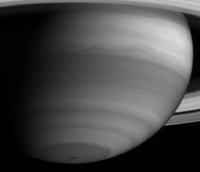
The Astrophysics Spectator
Today marks the 35th anniversary of Neil Armstrong's and Buzz Aldrin's first steps on the moon, a grand achievement that passed with little comment. I watched that event on television, which for that time was remarkable. NASA had mounted a television camera to the outside of the Lunar Excursion Module (LEM), and the television networks carried the images live. Like many of my coevals, I was space crazed as a child. We children had a space club, and to join you had to precisely draw each of the three types of space capsule.
The achievement of placing a man on the moon is of another era, with tiny spaceships with the retro look of an old Buck Rogers film short. The current manned program is almost moribund after the deaths of the Columbia astronauts almost a year and a half ago. Despite the Freedom space station, we seldom think of manned space flight as the cutting edge of modern technology. That image has shifted to the robot explorers traveling away from Earth.

An image taken by the Cassini spacecraft of the southern pole of Saturn. Photo credit: Courtesy NASA/JPL-Caltech.
This summer we have seen these robots achieve goals that are unobtainable with current manned flight. Two robots travel on the surface of Mars, exploring the geology of the planet close-up. Within the past month the Cassini spacecraft entered orbit around Saturn, becoming the first spacecraft to do so. The Messenger spacecraft is scheduled for launch on August 2 for a trip to Mercury, with entry into orbit of that planet planned for 2011. Robotic exploration of the solar system is active and successful. The dissemination of photographs and results from the Mars missions and the Saturn mission have drawn strong interest from a public that recognizes these missions as great technological achievements.
Is manned space flight still a great achievement? Certainly the placement of man into space requires a technical sophistication that is still at the cutting edge. But do the goals of manned space flight counts as great achievements? From a scientific stand point, we are better off with robots, because of the costs are low, the technological hurdles are lower, and the risk of life is largely absent. From the standpoint of astronomy, manned platforms are too unstable for telescopes, and are therefore of no value. Witness the absence of astronomy on the International Space Station, despite the availability of money for these projects. The the extent that manned space flight achieves anything, it is in reaching goals that fire our imaginations. From this standpoint, the redefinition of NASA's goal by President Bush was necessary for the health of manned space flight.
But today I find the achievements of unmanned space flight far more remarkable. The issue is then whether the manned space flight program helps or hurts the unmanned program. I believe that without the manned program, the unmanned program would be harmed financially. Just as a "peace dividend" never materialized at the end of the Cold War, I suspect that the federal money saved with a decrease in manned space flight spending would flow out of NASA entirely. Without manned space flight, spending on unmanned space flight might well decrease because of its lower profile. So for the health of the unmanned program, I support the manned program.
But looking at the pictures of the dry plains of Mars and the cold swirling ammonia clouds of Saturn's hydrogen atmosphere, I feel foreboding that we shouldn't be here. This is not a place for man. Let's send the robots.
Jim Brainerd
